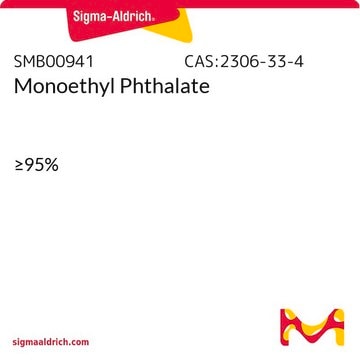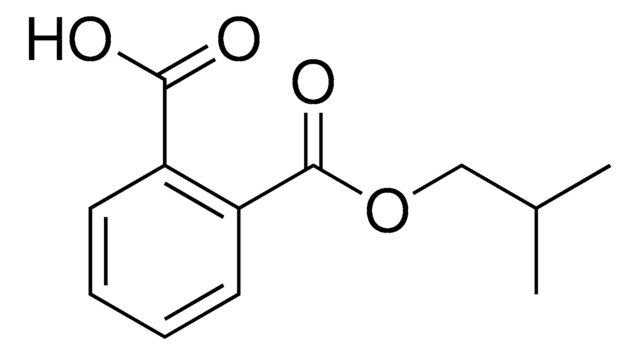89505
mono-Benzyl phthalate
analytical standard
Synonym(s):
1,2-Benzenedicarboxylic acid 1-(phenylmethyl) ester, Phthalic acid monobenzyl ester
About This Item
Recommended Products
grade
analytical standard
Quality Level
Assay
≥98.0% (HPLC)
shelf life
limited shelf life, expiry date on the label
technique(s)
HPLC: suitable
gas chromatography (GC): suitable
impurities
≤0.5% water
mp
103-108 °C
application(s)
cleaning products
cosmetics
environmental
food and beverages
personal care
format
neat
SMILES string
OC(C1=C(C(OCC2=CC=CC=C2)=O)C=CC=C1)=O
InChI
1S/C15H12O4/c16-14(17)12-8-4-5-9-13(12)15(18)19-10-11-6-2-1-3-7-11/h1-9H,10H2,(H,16,17)
InChI key
XIKIUQUXDNHBFR-UHFFFAOYSA-N
General description
Application
- Biological samples using high-performance liquid chromatography coupled to tandem mass spectrometry (HPLC-MS/MS).
- River water samples using gas chromatography coupled to mass spectrometry (GC-MS).
Recommended products
Signal Word
Warning
Hazard Statements
Precautionary Statements
Hazard Classifications
Eye Irrit. 2
Storage Class Code
11 - Combustible Solids
WGK
WGK 3
Flash Point(F)
Not applicable
Flash Point(C)
Not applicable
Choose from one of the most recent versions:
Already Own This Product?
Find documentation for the products that you have recently purchased in the Document Library.
Our team of scientists has experience in all areas of research including Life Science, Material Science, Chemical Synthesis, Chromatography, Analytical and many others.
Contact Technical Service






![mono-[(2RS)-2-Ethyl-5-oxohexyl] phthalate analytical standard](/deepweb/assets/sigmaaldrich/product/structures/380/975/47f8fcbc-594c-4f9c-84df-43685552cd06/640/47f8fcbc-594c-4f9c-84df-43685552cd06.png)

